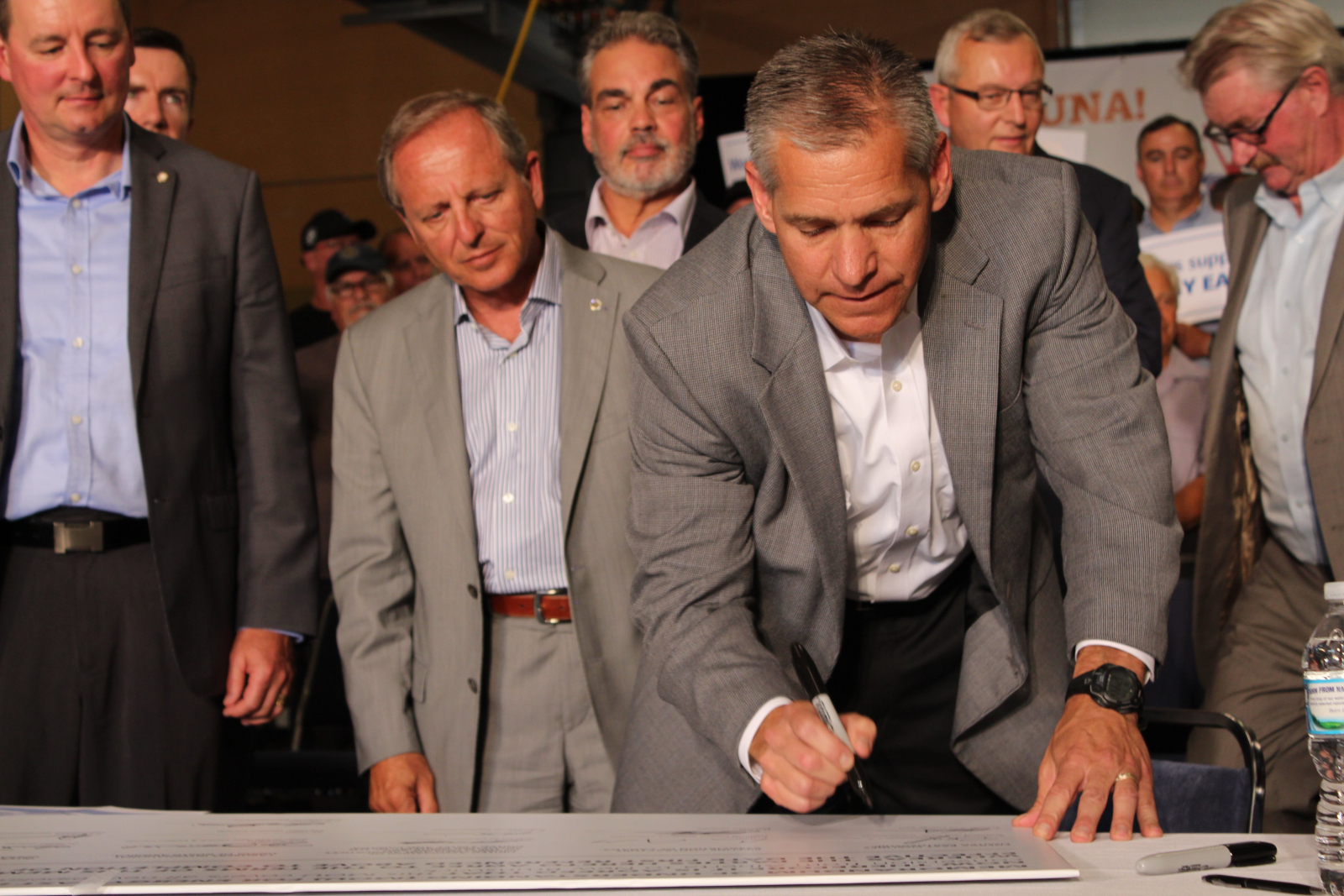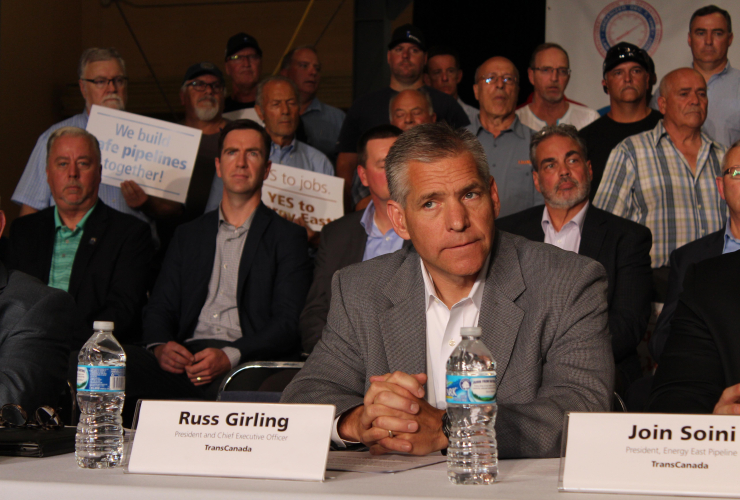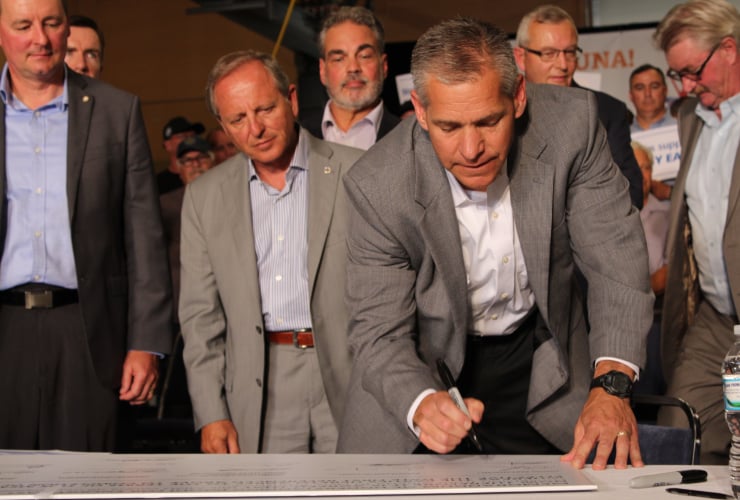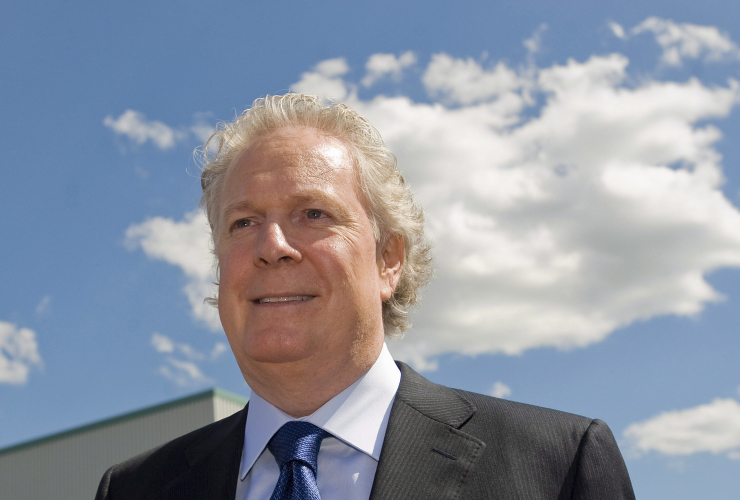Critics are accusing Quebec’s powerhouse Crown utility of bending over backwards for the oil industry.
Why, they ask, would Hydro-Québec sit on the sidelines during upcoming federal hearings to review of a huge pipeline project when the utility itself warned that TransCanada's proposed Energy East pipeline could threaten Quebec's electricity supply?
The controversy has been inflamed by revelations that one of Hydro-Québec's lawyers jumped to TransCanada and news that Ontario's Hydro One requested to be a full participant in the hearings. Critics say that Hydro-Québec is abandoning its responsibility to both landowners and customers and they question whether the process has been rigged to get the pipeline approved.
The criticism comes following the release of formal correspondence from both Hydro One in Ontario and Hydro-Québec to the federal regulator. The letters from the utility companies, posted on the website of Canada's National Energy Board, warned that Calgary-based TransCanada Corp’s continent-sized pipeline project could disrupt electricity supplies for millions of people in central Canada.
Former BC Hydro CEO Marc Eliesen said that Hydro-Québec's decision is puzzling.
"I’m astounded that they are not an intervenor," Eliesen told National Observer in an interview. "The interests of any utility and particular, the number one utility in the province of Quebec is so significant with respect to major energy infrastructure projects… You would have thought that... Hydro-Québec would ensure that they would look after their ratepayers' interests."
Hydro-Québec lawyers issued their warning in March 2015, explaining that interference from electric lines could cause the 4,500-kilometre pipeline's safety systems to fail, resulting in a disastrous leak that would encroach on the province’s transmission network, disrupting the supply. But few noticed at that time that Hydro-Québec declined to seek full status at federal hearings at the project. With full status, the Crown corporation would be able to present evidence to Canada’s National Energy Board (NEB) about implications to Canadian consumers as well as cross-examine TransCanada officials.
If approved, the Energy East project would ship more than one million barrels of oil per day, mainly from Alberta, Saskatchewan and North Dakota, to refineries in Quebec and Saint John, New Brunswick. A lot of the oil would then be shipped overseas.
While oil producers have said the project is essential to promoting jobs and expansion, many First Nations communities, environmentalists and politicians have opposed the pipeline arguing that it will lead to spills and exacerbate the pollution that contributes to climate change.
Hydro-Québec lawyer recruited by TransCanada Corporation becomes lobbyist
Hydro-Québec’s decision to sit on the sidelines for the NEB hearings is unusual. Apart from Hydro One in Ontario seeking and obtaining full status at the hearings, BC Hydro also obtained full status to participate in the recent NEB hearings to review the Kinder Morgan Trans Mountain pipeline expansion project to the west coast.
But there’s another twist to this story.
Carolina Rinfret, one of the lawyers whose name appeared in Hydro-Québec's March 2015 letter, wound up being recruited by TransCanada a few months later. She is now registered on a provincial lobbyist for TransCanada and in regular contact with the Crown corporation.
This leaves critics such as Jean Gosselin suspicious. The organic vegetable farmer, who operates the Ferme des Ruisseaux in the Quebec City region, is a fierce opponent of Energy East. He believes that Hydro-Québec is shirking its responsibilities to protect the government's assets and creating a "highly dangerous" cocktail of risks for the environment. He has serious questions about a potential conflict of interest between the crown corporation and the energy company after the latter recruited the Hydro-Québec lawyer, he said.
"Hydro-Quebec detains perpetual rights on our lands for its power lines and equipment. Therefore it is Hydro Québec's duty to defend the integrity of its installations on our grounds from another incoming pipeline nearby," Gosselin added.
Gosselin is an administrator of a Quebec landowners association, the Association des Producteurs Privés, Agricoles (acéricoles) et Forestiers. Its members have joined a large coalition of Quebecers who are opposed to Energy East, including a major association representing agricultural producers and farmers across the province, as well as all of the municipalities in the greater metropolitan region of Montreal. Gosselin notes that Hydro-Québec has vast resources compared to landowners, and he believes the Crown corporation should use this to its advantage to prevent a disaster.
But Hydro-Québec is dismissing Gosselin's concerns, noting that it has actively engaged with TransCanada and that its views would still present its views and comments at the NEB hearings through its shareholder, the government of Quebec.
“Hydro-Quebec won’t lose control or access to its own facilities at any time,” said Hydro-Québec spokesman Serge Abergel. “Furthermore, as is the case with any other project developer, Hydro-Québec has discussions with TCPL to establish methods of access to facilities in case the (Energy East) project is authorized to proceed.”
Abergel also confirmed that Carolina Rinfret, a veteran lawyer with Hydro-Québec for more than a decade, is now in regular contact with her former colleagues in the Crown corporation’s legal department, to exchange information about the project.
He said she is an “excellent lawyer and we have no doubts about her professional integrity. (She) simply decided to accept a job offer elsewhere.”
He added that there are no links between her departure and Hydro-Québec’s decision not to participate actively in the Energy East hearings. He said that she wasn't the one who made Hydro-Québec’s decision on the matter.

Rinfret, who according to her Linkedin profile, is now a senior legal counsel with TransCanada, did not respond to a request for comment. But a TransCanada spokesman who responded on her behalf said the company was following all rules.
“TransCanada and its employees respect all the laws and rules in place in the jurisdictions where we operate including the codes of conduct of professional orders such as the Barreau du Quebec,” said TransCanada spokesman Jonathan Abecassis. “There is no concern regarding the conduct of any of the Energy East or TransCanada personnel, including (the lawyer) Rinfret.”
Sixty-two deficiencies on TransCanada Keystone pipeline
It is commonly accepted that pipeline operators must be cautious around electrical transmission lines. They can interfere with anti-corrosion technology on pipelines, which increases the risk of ruptures or leaks.
Steven Guilbeault, a senior director at Quebec-based environmental group, Équiterre, said he’s concerned that the top experts at Hydro-Québec may not be heard at the hearings because of its decision.
“I was a bit surprised because we had had some meetings with various people at Hydro-Québec,” he said in an interview with National Observer. “Clearly within the company (Hydro-Québec) there are various people who have concerns about the Energy East project.”
Another energy company, Valero, has had corrosion problems on a brand new pipeline, installed in 2011, due to interference from Hydro-Québec transmission lines.
That same problem also led to significant damage to TransCanada’s brand new Keystone pipeline near St. Louis, Missouri along the Mississippi River after it went into service in 2010 - a matter that has prompted a federal investigation and fines.
Federal investigators in the U.S. had identified 62 deficiencies on Keystone - which is the original pipeline and not the expanded Keystone XL project proposal that was rejected by the U.S. government - alleging that TransCanada had failed to do required testing to ensure its corrosion protection systems were working.

The company also recently temporarily shut down Keystone in April following a spill in South Dakota.
TransCanada has said it has learned from its own experiences and improved its engineering practices.
Hydro One is taking "prudent" approach, says TransCanada
In its own letter to the National Energy Board seeking full status at the Energy East hearings, Hydro One said the proposed pipeline could disrupt a distribution system that serves more than 1.3 million customers in Ontario.
“There are inherent safety concerns when the Project crosses, or is adjacent to Hydro One’s transmission corridors,” wrote Joanne Richardson, director of of major projects and partnerships from the regulatory affairs office of Hydro One in a letter dated March 16, 2016.
“Since being notified of the Project, Hydro One has attended two public information centres and requested further details on land matters from the Applicant but has yet to receive sufficient details on land matters from the Applicant but has yet to receive sufficient detail pertaining to the route of the pipeline.”
Abecassis from TransCanada said it was normal that the pipeline company, which prepared a 38,885-page application for Energy East, hasn't finalized all land and crossing agreements at this stage of the project.
“I've spoken to a few of my colleagues and I can tell you that we have had numerous interactions with Hydro One and continue to discuss the project with them,” Abecassis said. “As for the NEB process, we consider it only prudent that Hydro One seek intervenor status to have a seat at the table.”
When asked about Hydro Quebec's decison to waive its prudence, Abecassis replied by email, "It would be inappropriate for us to comment on Hydro Quebec's decision."






Comments